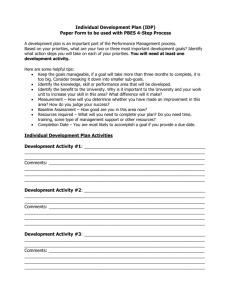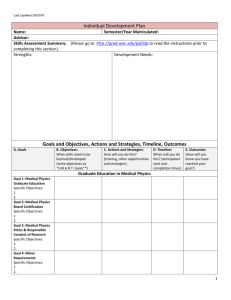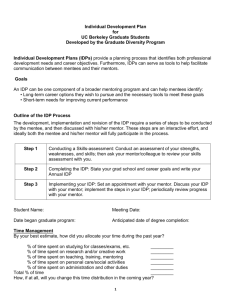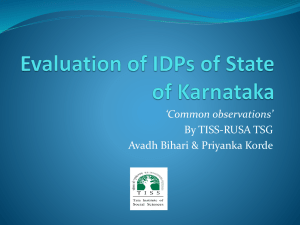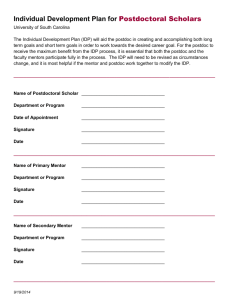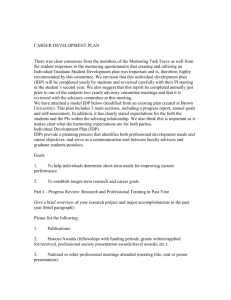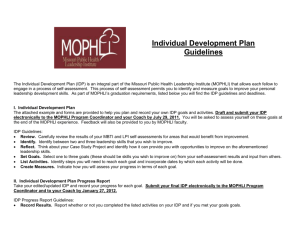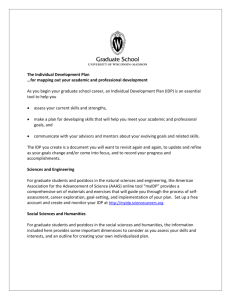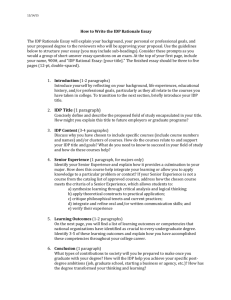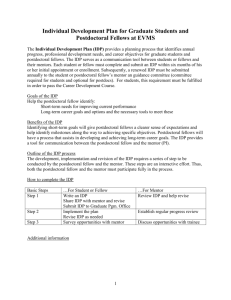THE Individual Development Plan - The Graduate School
advertisement
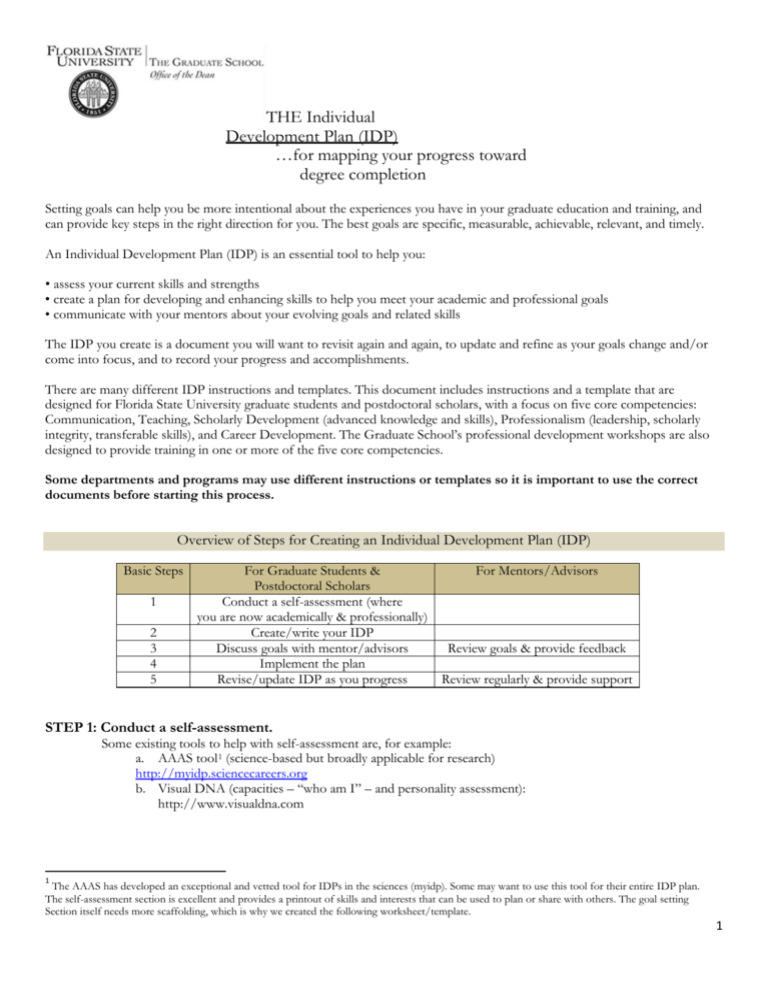
THE Individual Development Plan (IDP) …for mapping your progress toward degree completion Setting goals can help you be more intentional about the experiences you have in your graduate education and training, and can provide key steps in the right direction for you. The best goals are specific, measurable, achievable, relevant, and timely. An Individual Development Plan (IDP) is an essential tool to help you: • assess your current skills and strengths • create a plan for developing and enhancing skills to help you meet your academic and professional goals • communicate with your mentors about your evolving goals and related skills The IDP you create is a document you will want to revisit again and again, to update and refine as your goals change and/or come into focus, and to record your progress and accomplishments. There are many different IDP instructions and templates. This document includes instructions and a template that are designed for Florida State University graduate students and postdoctoral scholars, with a focus on five core competencies: Communication, Teaching, Scholarly Development (advanced knowledge and skills), Professionalism (leadership, scholarly integrity, transferable skills), and Career Development. The Graduate School’s professional development workshops are also designed to provide training in one or more of the five core competencies. Some departments and programs may use different instructions or templates so it is important to use the correct documents before starting this process. Overview of Steps for Creating an Individual Development Plan (IDP) Basic Steps 1 2 3 4 5 For Graduate Students & For Mentors/Advisors Postdoctoral Scholars Conduct a self-assessment (where you are now academically & professionally) Create/write your IDP Discuss goals with mentor/advisors Review goals & provide feedback Implement the plan Revise/update IDP as you progress Review regularly & provide support STEP 1: Conduct a self-assessment. Some existing tools to help with self-assessment are, for example: a. AAAS tool 1 (science-based but broadly applicable for research) http://myidp.sciencecareers.org b. Visual DNA (capacities – “who am I” – and personality assessment): http://www.visualdna.com 1 The AAAS has developed an exceptional and vetted tool for IDPs in the sciences (myidp). Some may want to use this tool for their entire IDP plan. The self-assessment section is excellent and provides a printout of skills and interests that can be used to plan or share with others. The goal setting Section itself needs more scaffolding, which is why we created the following worksheet/template. 1 Take some time to assess your skills. The goals you will include in your IDP are based on the strengths and areas needing improvement you identify, together with the milestone activities that mark successful progress through your program (e.g., preparing for prelims), plus any other specific skills and knowledge needed to prepare for your career. The suggested assessment items listed below are intended to cover basic/common skill areas across a broad range of fields. This list was adapted from the core competencies developed by the National Postdoctoral Association and is applicable to graduate students and postdoctoral scholars. Be sure to tailor the list to meet your own assessment needs by adding items, such as discipline- or career-specific skills that you become aware of after discussions with your mentors or others. How proficient do you think you are in the following areas? COMPETENCY: COMMUNICATION 1=Needs improvement 5= Highly proficient 1 2 3 4 5 N/A Writing for a general audience Writing for a discipline-specific audience Oral presentation for a general audience Oral presentation for a discipline-specific audience Social media communication & etiquette Email communication & etiquette Connecting with mentors Ability to receive constructive feedback Ability to give constructive feedback Networking inside your academic program Networking outside your academic program Other: Other: COMPETENCY: TEACHING 1=Needs improvement 5=Highly proficient 1 2 3 4 5 N/A Mentoring Tutoring Using your discipline’s teaching pedagogy Leading discussion section or lab Lecturing Serving as teaching assistant Other: Other: COMPETENCY: SCHOLARLY DEVELOPMENT (Advanced knowledge & skills in your field) 1=Needs improvement 5=Highly proficient 1 2 3 4 5 N/A Technical skills related to my research/creative area (e.g., analytical skills, data analysis) -Specific technical skill: -Specific technical skill: -Specific technical skill: Detailed knowledge of my research/creative area -Specific knowledge: -Specific knowledge: -Specific knowledge: 2 COMPETENCY: PROFESSIONALISM (Leadership, scholarly integrity, transferable skills) 1=Needs improvement 5=Highly proficient 1 2 3 4 5 N/A Respecting contributions of others Demonstrating cultural competence Working with diverse groups/teams Avoiding conflicts of interest Demonstrating responsible academic & professional conduct Demonstrating skills useful in diverse academic & professional settings Motivating others Managing projects & time Assuming leadership positions Participating in service opportunities COMPETENCY: CAREER DEVELOPMENT 1=Needs improvement 5=Highly proficient 1 2 3 4 5 N/A CV/Résumé building Establishing career goals Awareness of career opportunities in your field Awareness of career-oriented graduate certificates Attending career-oriented professional development workshops Exploring career-focused academic certificates Other: What are your current responsibilities/requirements and career goals? As part of the assessment process, and in preparation for creating a truly individualized IDP, ask yourself some questions related to your current responsibilities/requirements and career goals. Doing so will lead you to actions or goals to incorporate into your plan. Focus on developing skills that will lead to your success in your current position and beyond. Currently What are the requirements and responsibilities you must meet during the next year? Two years? What are the technical skills or discipline-specific knowledge that you need to develop? What scholarly activities would you like to accomplish or work toward during the next year? Two years? (Examples: Join a professional organization, present at a conference, co-author a paper?) Other? Future Position What type of work would you like to do? What is important to you in your future career? What competencies are required for your chosen career? How well do your current skills match the competencies required for your chosen career? What are your short-term goals related to career exploration? (Examples: Learn how to write scientific Papers; conduct informational interviews; find out where graduates in my field are working/finding careers…) How will you develop contacts--a network--related to your career exploration goals? Other? 3 STEP 2: Write your IDP. Some important things to remember in writing your IDP: • It is a living document that will and should be updated and changed as often as necessary. • Identify specific and achievable objectives or skills to be learned (column 1). • Write these in a way that makes very clear what you are going to do. The goals should be Specific, Measurable, Attainable, Relevant, Time-limited 2. A specific goal will usually answer the five "W" questions: What: What do I want to accomplish? Why: Specific reasons, purpose or benefits of accomplishing the goal Who: Who is involved? Where: Identify a location Which: Identify requirements and constraints A measurable goal will usually answer questions such as: How much? / How many? / How will I know when it is accomplished? An attainable goal will usually answer the question: How: How can the goal be accomplished? A relevant goal can answer yes to these questions: Does this seem worthwhile? Is this the right time? / Am I the right person? Does this match my/our other efforts/needs? A time-limited goal will usually answer the questions: When? / What can I do six months from now? / What can I do six weeks from now? What can I do today? • Define approaches and strategies (column 2), and include a timeframe for beginning and completing the actions you have outlined (column 3). • Make sure to have an outcome statement that is clear enough to allow someone (including you) to know whether you have met your goal (column 4) GOALS 1. Communication Goals Goals or skills to be learned Example: Initiate mentoring relationships. Approaches or strategies 3 Interact with academic program faculty and graduate students further along in the program. Attend mentoring workshop/seminar. Outcomes 4 Timeframe Academic 2014-2015 year, Established mentoring relationships. 2 Meyer, Paul J (2003). "What would you do if you knew you couldn’t fail? Creating S.M.A.R.T. Goals". Attitude Is Everything: If You Want to Succeed Above and Beyond. Meyer Resource Group, Incorporated. 3 Think about the resources, experiences, and/or activities you will need to help you accomplish your goal. 4 Think about what you will see, do or be when you accomplish this goal. How will you reach it? If it is difficult to say, you need to reframe the goal to be more concrete, specific and actionable. 4 2. Teaching Goals Objectives, or skills to be learned Example: Able to use instructional technology. Approaches & strategies Participate in instructional technology (e.g., Blackboard) training. Lesson planning to include use of instructional technology. Timeframe Outcomes Academic year 2014-2015 Communicate with undergraduate students through Blackboard system. Incorporate instructional technology into teaching. 3. Scholarly Development Goals (advanced knowledge & skills in your field) Objectives, or skills to be learned Example: Adept in the use of online bibliographic tools Approaches & strategies From the University Libraries, receive training in the use of RefWorks and other online database software. Timeframe Outcomes Fall 2014 Utilize RefWorks or other online database software for citation management. 4. Professionalism Goals (Leadership, scholarly integrity, transferable skills) Objectives or skills to be Approaches & strategies learned Example: Receive training in professional research/creative ethics. Enroll in Responsible Conduct of Research/Creative Endeavors Course (RCRC). Timeframe Outcomes Spring 2015 Demonstrate ability to identify the nine core areas of RCRC. Complete the RCRC Post-test with 80% rate of accuracy. 5 5. Career Development Goals Objectives or skills to be Approaches learned strategies Example: Create a Curriculum Vitae (CV). & Timeframe Attend a CV workshop. Meet with a Career Center advisor to critique CV. Make revisions as needed. 2014-2015 academic year Outcomes A professional CV Discuss STEP 3: Discuss with your mentor/advisor. The purpose of discussing the results of your skills assessment and your career goals and interests with your mentor is to help you identify areas needing improvement. By helping you compare current skills and strengths with those needed to achieve your career objectives, your mentor can be an important ally. In addition to discussing your plan with your primary mentor, you should also be creative when you approach others for advice. You can receive useful feedback from multiple people with a broad range of experiences and perspectives, including friends, family, staff, and faculty other than your primary mentor. Implement STEP 4: Implement your plan (IDP). Put your plan into action and seek support you may need to remain on track. Remember that you should be flexible and modify your IDP if your goals or circumstances change. Refer to your IDP often and add your IDP deadlines to your calendar to integrate them with deadlines for other work and personal events. Revise STEP 5: Review and revise your IDP. Review your IDP with your mentor on a regular basis (on a schedule decided upon together) and revise/update. At a minimum, you should revisit and discuss your IDP with your mentor annually. Discussed with advisor/mentor (date):______________________________ Adapted with permission from the Graduate School, University of Wisconsin-Madison and the University of Washington Graduate School. 6
